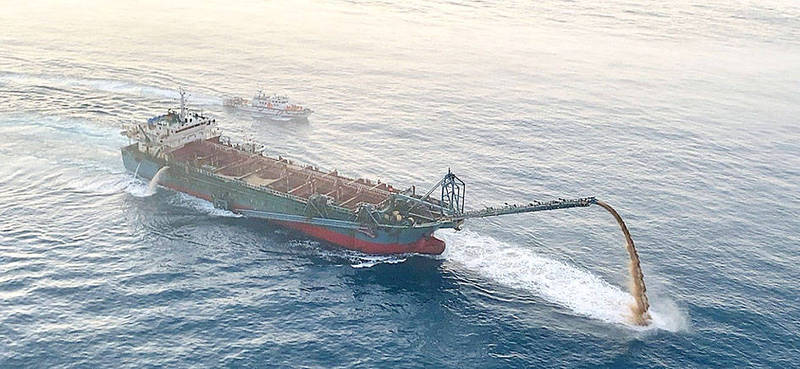《TAIPEI TIMES》 Officials urge action over Chinese dredging activity

A Chinese dredging vessel, front, operates off Tainan on April 26 last year. Photo courtesy of the Coast Guard via CNA
LEGAL REMEDY: An expert said China banned dredging in its territorial waters, but it subsidizes civilian vessels to engage in the work under its coast guard’s protection
By Yang Yuan-ting and Jonathan Chin / Staff reporter, with staff writer and CNA
Taiwanese officials and academics on Wednesday urged Southeast Asian nations to initiate joint legal action against China, citing environmental and economic havoc wreaked by sand dredging operations enabled by Beijing.
The international community should make use of strategic, legal and environmental means to tackle China’s illegal dredging, which has a serious negative effect on the region, Ocean Affairs Council Minister Kuan Bi-ling (管碧玲) told an international conference on dredging in Taipei.
The International Conference on the Impact of Sand Dredging on the Sea was a collaboration between the council and National Taiwan Ocean University. It was attended by academics from Japan, Malaysia, the Philippines and the US.
In 2013, Beijing begin digging up sand and building artificial islands with a fleet of dredgers near the Paracel Islands (Xisha Islands, 西沙群島), causing massive environmental damage, said Gregory Poling, director of the Southeast Asia Program and the Asia Maritime Transparency Initiative at the US-based Center for Strategic and International Studies.
These activities are part of Beijing’s strategy of utilizing its coast guard and artificial islands to deny access to the South China Sea to those that dispute China’s claims, Poling said.
China banned dredging in its territorial waters while simultaneously subsidizing civilian vessels to engage in the same behavior under the protection of the Chinese Coast Guard, which severely harms the legal rights of other nations, he said.
The privilege of a nation-state to exploit resources within its economic maritime zone does not absolve that nation of its responsibility to protect the ocean environment, said Tsai Chi-ting (蔡季廷), an associate professor of political science at National Taiwan University.
Although international maritime law does not specifically regulate sand dredging, the discriminatory nature of Chinese dredging runs contrary to the responsible management of ocean resources required by the laws and conventions within the industry, Tsai said.
Beijing should acknowledge that its dredging operations are an obvious breach of international law and desist, he said.
China has been excavating sand from the seabed near Lienchiang County since 2018, when Beijing declared that Taiwanese waters could be utilized for sand dredging to support China’s construction sector, the National Academy of Marine Research wrote in a news release.
A recent sonar survey found holes from dredging — including some that are up to 5m deep and cover nearly 600m2 — over 40 percent of the seabed off the Matsu islands, it said, adding that dredging has clearly altered the natural topography.
Seabed zones that showed signs of dredging supported a significantly lower density of planktonic plants and fish larvae, which indicated that the activity caused ecological damage, it said.
China’s dredgers have removed enough sand from the waters off Taiwan to severely degrade the ocean environment, said Jeng Ming-shiou (鄭明修), a marine biologist and Academia Sinica researcher.
Dredging could change the structure of the seabed sand layer, which would have devastating ecological repercussions, he said.
Sand from the sea is widely regarded as a strategic resource and dredging is a global industry that generated US$60 billion in 2018, said Rima Prama Artha, lead economist at Indonesia’s Danareksa Research Institute.
Sand dredging is contributing to the loss of 24 Indonesian islands and could harm the livelihoods of 35,000 fishers in the country, she said.
Taiwan should act in concert with other democratic nations to handle China’s illegal dredging, as the nation’s lack of UN membership would complicate its efforts to seek redress through legal means, said Makoto Seta, associate professor of international law at Japan’s Waseda University.
Additional reporting by Hung Ting-hung
新聞來源:TAIPEI TIMES


















